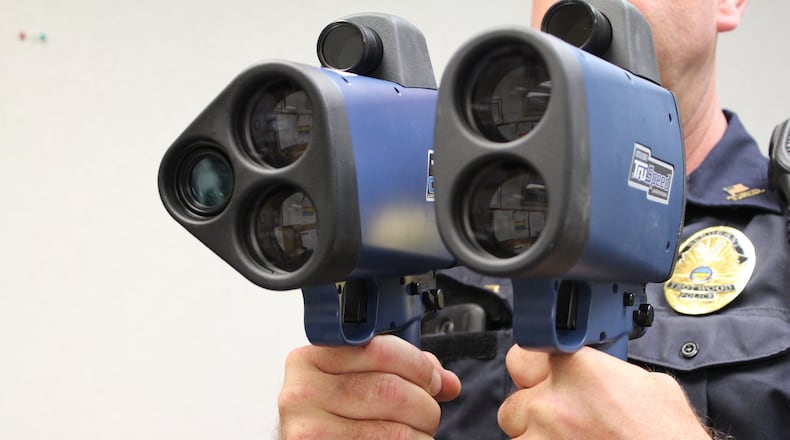But officials in these cities say speed cameras are effective at making roads safer and aid law enforcement.
Trotwood likely will become the second Ohio city to use handheld automated cameras to issue civil citations by mail, while officials in Dayton and some other places are looking at using automated cameras — including handheld devices — in ways that adhere to state law.
Toledo started using handheld speed cameras earlier this year and issued tickets to more than 2,300 motorists in the month of March alone, according to the Toledo Blade.
This spring, the city of Dayton issued a request for proposals asking vendors to bid on a multi-year photo enforcement cameras system. Dayton indicated it wanted 10 fixed cameras sites across the city, as well as six handheld and other mobile camera devices.
Dayton police officials said they needed to evaluate the financial viability of the program, considering officers will have to monitor and man the devices.
The city remains in the review process.
“Once this has been completed, we will make a recommendation to the city manager about whether the use of this technology is recommended, and if so how it would be employed,” said Dayton police Chief Richard Biehl.
Last week, Trotwood police officers started using two new handheld speed-detection cameras to issue warnings to motorists who travel faster than the posted speed limits.
“This is about Trotwood utilizing its resources to the fullest extent with reduced staffing and reduced funding,” said Capt. Dan Heath with the Trotwood Police Department.
Under state law, Trotwood must issue warnings for 30 days before the city can start fining motorists for violations captured by automated cameras, which take both photographs and video of speeding vehicles.
Nov. 12 is the final day of the warning period. After that, the city will mail out civil fines to motorists who are caught on tape breaking the law.
Police officers expect to use the cameras every day to monitor high-risk roadways and intersections and deter motorists from traveling at unsafe speeds, officials said.
Officers will download the high-definition images, video and other information captured by the cameras, and citations will be mailed out to the registered owners of the offending vehicles.
Fines will be $85 and points will not be added to drivers’ records.
The cameras allow police to issue civil citations without having to follow and pull over speeding vehicles, which avoids dangerous pursuits, said Heath.
“This is about identifying motorists who are violating our speed laws and holding them accountable for it,” he said. “Hopefully, we will get their attention enough that they will voluntarily comply with the speed laws.”
In early 2006, Trotwood began using fixed automated cameras to cite motorists who ran red lights or traveled above the posted speed limits. The city collected more than $1.9 million in fines through the program.
But Trotwood, Dayton and other communities with fixed cameras were forced to shut them down last year because state lawmakers passed legislation requiring officers to be present and monitor the cameras when they record violations.
Opponents of automated cameras say cities use them first and foremost as revenue generators but dishonestly say they are safety measures.
About the Author

